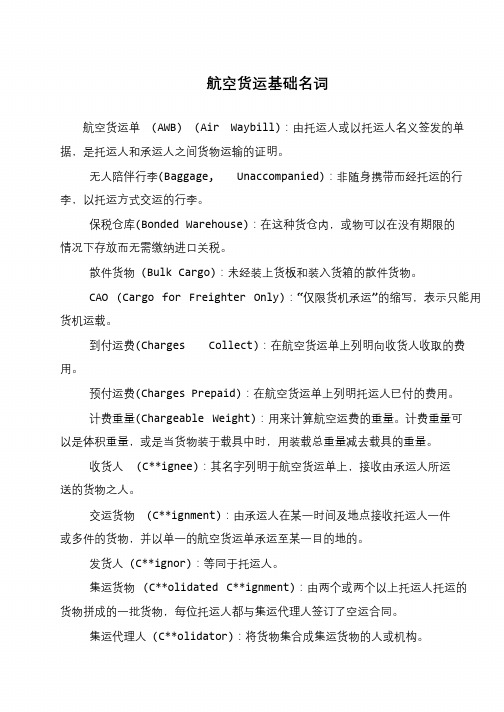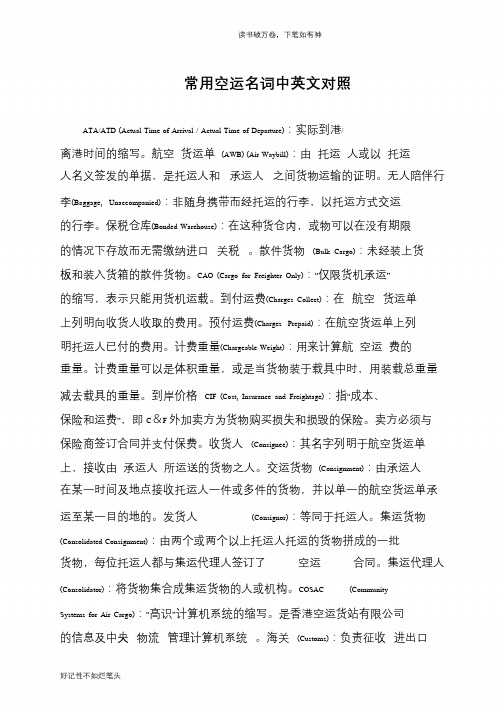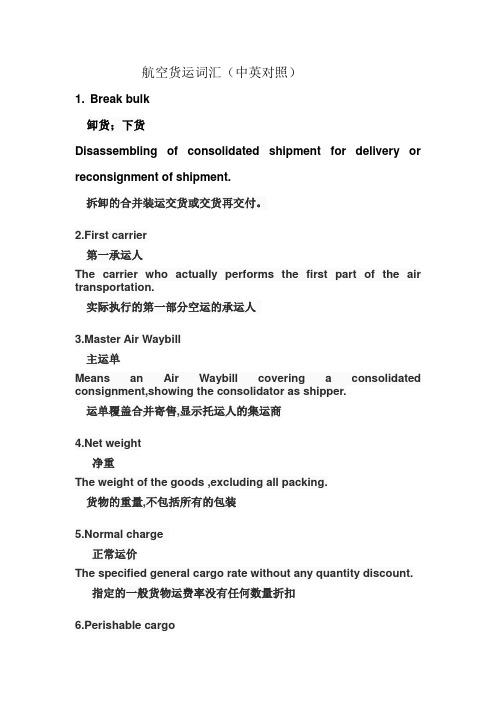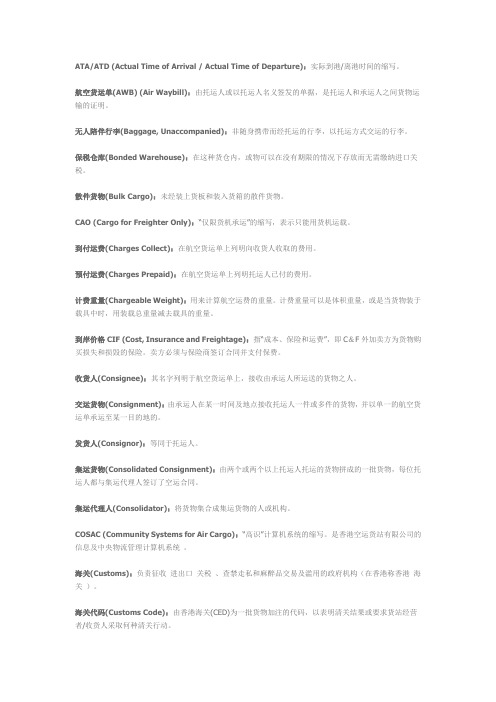航空货运名词中英文对照
航空货运基础名词

航空货运基础名词
航空货运单(AWB) (Air Waybill):由托运人或以托运人名义签发的单据,是托运人和承运人之间货物运输的证明。
无人陪伴行李(Baggage, Unaccompanied):非随身携带而经托运的行李,以托运方式交运的行李。
保税仓库(Bonded Warehouse):在这种货仓内,或物可以在没有期限的
情况下存放而无需缴纳进口关税。
散件货物(Bulk Cargo):未经装上货板和装入货箱的散件货物。
CAO (Cargo for Freighter Only):“仅限货机承运”的缩写,表示只能用货机运载。
到付运费(Charges Collect):在航空货运单上列明向收货人收取的费用。
预付运费(Charges Prepaid):在航空货运单上列明托运人已付的费用。
计费重量(Chargeable Weight):用来计算航空运费的重量。
计费重量可
以是体积重量,或是当货物装于载具中时,用装载总重量减去载具的重量。
收货人(C**ignee):其名字列明于航空货运单上,接收由承运人所运
送的货物之人。
交运货物(C**ignment):由承运人在某一时间及地点接收托运人一件
或多件的货物,并以单一的航空货运单承运至某一目的地的。
发货人(C**ignor):等同于托运人。
集运货物(C**olidated C**ignment):由两个或两个以上托运人托运的
货物拼成的一批货物,每位托运人都与集运代理人签订了空运合同。
集运代理人(C**olidator):将货物集合成集运货物的人或机构。
常用空运名词中英文对照

读书破万卷,下笔如有神常用空运名词中英文对照ATA/ATD (Actual Time of Arrival / Actual Time of Departure):实际到港/ 离港时间的缩写。
航空货运单(AWB) (Air Waybill):由托运人或以托运人名义签发的单据,是托运人和承运人之间货物运输的证明。
无人陪伴行李(Baggage, Unaccompanied):非随身携带而经托运的行李,以托运方式交运的行李。
保税仓库(Bonded Warehouse):在这种货仓内,或物可以在没有期限的情况下存放而无需缴纳进口关税。
散件货物(Bulk Cargo):未经装上货板和装入货箱的散件货物。
CAO (Cargo for Freighter Only):“仅限货机承运”的缩写,表示只能用货机运载。
到付运费(Charges Collect):在航空货运单上列明向收货人收取的费用。
预付运费(Charges Prepaid):在航空货运单上列明托运人已付的费用。
计费重量(Chargeable Weight):用来计算航空运费的重量。
计费重量可以是体积重量,或是当货物装于载具中时,用装载总重量减去载具的重量。
到岸价格CIF (Cost, Insurance and Freightage):指“成本、保险和运费”,即C&F 外加卖方为货物购买损失和损毁的保险。
卖方必须与保险商签订合同并支付保费。
收货人(Consignee):其名字列明于航空货运单上,接收由承运人所运送的货物之人。
交运货物(Consignment):由承运人在某一时间及地点接收托运人一件或多件的货物,并以单一的航空货运单承运至某一目的地的。
发货人(Consignor):等同于托运人。
集运货物(Consolidated Consignment):由两个或两个以上托运人托运的货物拼成的一批货物,每位托运人都与集运代理人签订了空运合同。
集运代理人(Consolidator):将货物集合成集运货物的人或机构。
空运常用术语中英文对照

空运常用术语中英文对照1. 常用术语解释在空运领域,有许多常用的术语,这些术语在中英文之间存在着对应关系。
以下是一些常见的空运术语及其中英文对照:•空运 (r freight): 将货物通过飞机运输的过程。
空运通常比海运更快速,适用于紧急货物,但运费相对较高。
•货代 (Freight forwarder): 为客户安排运输服务的公司,负责处理货物的运输、装卸、报关等事务。
也叫做货运代理。
•起运港 (Port of origin): 货物装运的起始港口。
•目的港 (Port of destination): 货物运到的目标港口。
•运输单证 (Transportation document): 是一种用于记录货物运输信息的文件,包括装运单、提单、舱单等。
•提单 (Bill of lading): 是一种货物所有权的凭证,标明货物的数量、种类、目的地等信息。
•危险品 (Dangerous goods): 是指某些具有潜在危险性的物质,如化学品、气体、易燃物等。
•集装箱 (Contner): 是一种用于运输货物的装置,通常由金属制成,具有标准尺寸,可在不同的运输工具之间转运。
•航班号 (Flight number): 是标识航空公司航班的唯一编号。
•包装 (Packaging): 为了保护货物在运输过程中不受损而采取的措施。
•仓储 (Warehousing): 是指存储、管理和分配货物的过程。
•装卸 (Loading and unloading): 是指将货物从运输工具上卸下或装载上去。
•报关 (Customs clearance): 是指向海关申报并办理相关手续,以使货物合法进出国境。
•保险 (Insurance): 是一种为货物运输风险提供赔偿保障的机制。
2. 空运术语的中英文对照下表列出了一些常见的空运术语及其对应的中英文翻译。
中文术语英文术语空运r freight货代Freight forwarder起运港Port of origin目的港Port of destination运输单证Transportation document提单Bill of lading危险品Dangerous goods集装箱Contner航班号Flight number包装Packaging仓储Warehousing装卸Loading and unloading报关Customs clearance保险Insurance3. 术语的使用场景这些空运术语在实际的空运业务中经常出现,并且在货代、航空公司、海关等环节都有其特定的应用。
国际航空货运词汇

航空货运词汇(中英对照)1. Break bulk卸货;下货Disassembling of consolidated shipment for delivery or reconsignment of shipment.拆卸的合并装运交货或交货再交付。
2.First carrier第一承运人The carrier who actually performs the first part of the air transportation.实际执行的第一部分空运的承运人3.Master Air Waybill主运单Means an Air Waybill covering a consolidated consignment,showing the consolidator as shipper.运单覆盖合并寄售,显示托运人的集运商 weight净重The weight of the goods ,excluding all packing.货物的重量,不包括所有的包装5.Normal charge正常运价The specified general cargo rate without any quantity discount.指定的一般货物运费率没有任何数量折扣6.Perishable cargo易腐货物Goods which will deteriorate over a given period of time or if exposed to adverse temperature ,humidity or other environmental conditions.如果暴露在不利的温度、湿度或其他环境条件将在给定的时间内恶化.的货物。
7.Pick-up service接送服务The carriage of outbound consignments from the point of pick-up to the airport of departure.运输出境货物从提货到机场出发。
外贸基础知识—常用空运名词中英文对照.doc

基础知识一常用空运名词中英文对照ATA/ ATD (Actual Time of Arrival / Actual Time of Departure):实际到港/离港时间的缩写。
航空货运单(AWB) (Air Waybill):由托运人或以托运人名义签发的单据,是托运人和承运人之间货物运输的证明。
无人陪伴行李(Baggage, Unaccompanied):非随身携带而经托运的行李,以托运方式交运的行李。
保税仓库(Bonded Warehouse):在这种货仓内,或物可以在没有期限的情况下存放而无需缴纳进I I关税。
散件货物(Bulk Cargo):未经装上货板和装入货箱的散件货物。
CAO (Cargo for Freighter Only):“仅限货机承运”的缩写,表示只能用货机运载。
到付运费(Charges Collect):在航空货运单上列明向收货人收取的费用。
预付运费(Charges Prepaid):在航空货运单上列明托运人已付的费用。
计费重fi(Chargeable Weight):用来计算航空运费的重量。
计费重量可以是体积重量,或是当货物装于我具中时,用装载总重量减去载具的重量。
到岸价格CIF(Cost, Insurance and Freightage):指“成本、保险和运费”,即C&F外加卖方为货物购买损失和损毁的保险。
卖方必须与保险尚签订合同并支付保费。
收货人(Consignee):其名字列明于航空货运单上,接收山承运人所运送的货物之人。
交运货^(Consignment):由承运人在某一时间及地点接收托运人一件或多件的货物,并以单一的航空货运单承运至某一目的地的。
发货人(Consignor):等同于托运人。
集运货物(Consolidated Consignment):由两个或两个以上托运人托运的货物拼成的一批货物,每位托运人都与集运代理人签订了空运合同。
集运代理A(Consolidator):将货物集合成集运货物的人或机构。
国际空运术语解释中英文对照

国际空运术语解释中英文对照国际空运术语解释中英文对照随着全球化的进程,越来越多的物流和贸易活动需要进行跨国空运,但这种活动涉及到许多专业的术语,让许多人感到困惑。
因此,本文将对一些常见的国际空运术语进行解释,并提供中英文对照,以帮助大家更好地了解和使用这些术语。
1. Air Waybill (AWB) 空运提单空运提单是指货物所有权转移的证明文件,是货物运输合同的重要组成部分。
它记录了货物从起点到终点的航班、航空公司、件数、重量、货物描述和收货人等信息。
空运提单分为两种:电子空运提单和纸质空运提单。
2. Freight Forwarder 货运代理货运代理是一家商业公司,为客户提供航运、陆运、海运和多式联运服务,包括货物装卸、包装、运输、报关和保险等。
货运代理可以根据客户需要,提供详细的货物追踪和货运报告等定制化服务。
3. Chargeable Weight 收费重量收费重量是指除客舱内人员和行李外的所有货物重量总和,包括货物本身重量、包装材料重量和托盘等。
航空公司通常按照收费重量计算空运费用。
4. Dangerous Goods 危险品危险品是指可以对人类、动物或者物质造成伤害或者损害的物质。
如化学品、爆炸品、放射性物质等。
航空公司有严格的运输危险品规定,必须符合国际危险品运输协定的要求。
5. Customs Declaration 报关单报关单是指出口货物必须提交给海关的文件,它详细记录了货物的品名、数量、重量、价格、出发地和目的地等相关信息。
报关单是海关放行货物的凭证,同时也是海关对货物的监管手段。
6. Transit Time 运输时间运输时间是指从货物发出到抵达目的地所需的时间,包括处理时间、转运时间和交货时间。
航空货物的运输时间通常比海运货物的运输时间更短,但价格也更高。
7. Airport of Departure/Arrival 出发/到达机场出发机场指货物离开的机场,到达机场指货物到达的机场。
空运专业名词中英文对照

常用空运名词中英文对照ATA/ATD (Actual Time of Arrival / Actual Time of Departure):实际到港/离港时间的缩写。
航空货运单 (AWB) (Air Waybill):由托运人或以托运人名义签发的单据,是托运人和承运人之间货物运输的证明。
无人陪伴行李(Baggage, Unaccompanied):非随身携带而经托运的行李,以托运方式交运的行李。
保税仓库(Bonded Warehouse):在这种货仓内,或物可以在没有期限的情况下存放而无需缴纳进口关税。
散件货物 (Bulk Cargo):未经装上货板和装入货箱的散件货物。
CAO (Cargo for Freighter Only):“仅限货机承运”的缩写,表示只能用货机运载。
到付运费(Charges Collect):在航空货运单上列明向收货人收取的费用。
预付运费(Charges Prepaid):在航空货运单上列明托运人已付的费用。
计费重量(Chargeable Weight):用来计算航空运费的重量。
计费重量可以是体积重量,或是当货物装于载具中时,用装载总重量减去载具的重量。
到岸价格CIF (Cost, Insurance and Freightage):指“成本、保险和运费”,即C&F 外加卖方为货物购买损失和损毁的保险。
卖方必须与保险商签订合同并支付保费。
收货人 (Consignee):其名字列明于航空货运单上,接收由承运人所运送的货物之人。
交运货物 (Consignment):由承运人在某一时间及地点接收托运人一件或多件的货物,并以单一的航空货运单承运至某一目的地的。
发货人 (Consignor):等同于托运人。
集运货物 (Consolidated Consignment):由两个或两个以上托运人托运的货物拼成的一批货物,每位托运人都与集运代理人签订了空运合同。
集运代理人 (Consolidator):将货物集合成集运货物的人或机构。
货代基础知识—常用空运名词中英文对照

ATA/ATD (Actual Time of Arrival / Actual Time of Departure):实际到港/离港时间的缩写。
航空货运单(AWB) (Air Waybill):由托运人或以托运人名义签发的单据,是托运人和承运人之间货物运输的证明。
无人陪伴行李(Baggage, Unaccompanied):非随身携带而经托运的行李,以托运方式交运的行李。
保税仓库(Bonded Warehouse):在这种货仓内,或物可以在没有期限的情况下存放而无需缴纳进口关税。
散件货物(Bulk Cargo):未经装上货板和装入货箱的散件货物。
CAO (Cargo for Freighter Only):“仅限货机承运”的缩写,表示只能用货机运载。
到付运费(Charges Collect):在航空货运单上列明向收货人收取的费用。
预付运费(Charges Prepaid):在航空货运单上列明托运人已付的费用。
计费重量(Chargeable Weight):用来计算航空运费的重量。
计费重量可以是体积重量,或是当货物装于载具中时,用装载总重量减去载具的重量。
到岸价格CIF (Cost, Insurance and Freightage):指“成本、保险和运费”,即C&F外加卖方为货物购买损失和损毁的保险。
卖方必须与保险商签订合同并支付保费。
收货人(Consignee):其名字列明于航空货运单上,接收由承运人所运送的货物之人。
交运货物(Consignment):由承运人在某一时间及地点接收托运人一件或多件的货物,并以单一的航空货运单承运至某一目的地的。
发货人(Consignor):等同于托运人。
集运货物(Consolidated Consignment):由两个或两个以上托运人托运的货物拼成的一批货物,每位托运人都与集运代理人签订了空运合同。
集运代理人(Consolidator):将货物集合成集运货物的人或机构。
- 1、下载文档前请自行甄别文档内容的完整性,平台不提供额外的编辑、内容补充、找答案等附加服务。
- 2、"仅部分预览"的文档,不可在线预览部分如存在完整性等问题,可反馈申请退款(可完整预览的文档不适用该条件!)。
- 3、如文档侵犯您的权益,请联系客服反馈,我们会尽快为您处理(人工客服工作时间:9:00-18:30)。
空运名词中英文对照ATA/ATD (Actual Time of Arriv al / Actual Time of Departure):实际到港/离港时间的缩写。
航空货运单(AWB) (Air Way bill):由托运人或以托运人名义签发的单据,是托运人和承运人之间货物运输的证明。
无人陪伴行李(Baggage,Unaccompanied):非随身携带而经托运的行李,以托运方式交运的行李。
保税仓库(Bonded Warehouse):在这种货仓内,或物可以在没有期限的情况下存放而无需缴纳进口关税。
散件货物(Bulk Cargo):未经装上货板和装入货箱的散件货物。
CAO (Cargo f or Freighter Only):“仅限货机承运”的缩写,表示只能用货机运载。
到付运费(Charges Collect):在航空货运单上列明向收货人收取的费用。
预付运费(Charges Prepaid):在航空货运单上列明托运人已付的费用。
计费重量(Chargeable Weight):用来计算航空运费的重量。
计费重量可以是体积重量,或是当货物装于载具中时,用装载总重量减去载具的重量。
到岸价格CIF (Cost,Insurance and Freightage):指“成本、保险和运费”,即C&F外加卖方为货物购买损失和损毁的保险。
卖方必须与保险商签订合同并支付保费。
收货人(Consignee):其名字列明于航空货运单上,接收由承运人所运送的货物之人。
交运货物(Consignment):由承运人在某一时间及地点接收托运人一件或多件的货物,并以单一的航空货运单承运至某一目的地的。
发货人(Consignor):等同于托运人。
集运货物(Consolidated Consignment):由两个或两个以上托运人托运的货物拼成的一批货物,每位托运人都与集运代理人签订了空运合同。
集运代理人(Consolidator):将货物集合成集运货物的人或机构。
COSAC (Community Sy stems f or Air Cargo):“高识”计算机系统的缩写。
是香港空运货站有限公司的信息及中央物流管理计算机系统。
海关(Customs):负责征收进出口关税、查禁走私和麻醉品交易及滥用的政府机构(在香港称香港海关)。
货物goods | | freight | | cargo运输transportation | | transit | | conveyance运送to transport | | to carry | | to convey运输业transportation business | | forwarding business | | carrying trade运输代理人a forwarding agent承运人 a freight agent | | a carrier船务代理人a shipping agent陆上运输transportation by land海上运输transportation by sea货物运输goods traffic | | freight traffic | | carriage of freights | | carriage of goods货轮cargo boat | | freighter | | cargo steamer | | cargo carrier 火车goods-train | | freight-train卡车goods-van | | goods wagon | | freight car | | truck货运办公室goods-office | | freight-department运费率freight | | freight rates | | goods rate运费carriage charges | | shipping expenses | | express charges 车费cartage | | portage运费预付carriage prepaid | | carriage paid运费到付carriage forward | | freight collect运费免除||免费carriage free协定运费conference freight | | freight rate运费清单freight accountClearly explain the nature and purpose of cargo insurance with reference to overseas trade and should include references to the EXW, FOB, CFR, CIF, DDPCargo InsuranceThe purpose of cargo insurance is to protect the cargo owner's financial interests while their cargo is exposed to the risks of transit. Air and ocean carriers provide limited coverage while a shipment is in their possession. The bill of lading states the liability that the carrier assumes. It is critical that the shipper understand that the carrier is not responsible for such perils as "Acts of God." When filing a claim with a carrier, the shipper must prove the cause of loss, that the loss occurred while in the carrier's posession, and that the carrier is directly liable for the loss.----What is cargo insurance?Cargo insurance (also called marine cargo insurance) covers physical damage to, or loss of your goods whilst in transit by land, sea and air and offers considerable opportunities and cost advantages if managed correctly. Unfortunately, many UK traders do not want to become involved in arranging this type of insurance because they feel they do not have sufficient knowledge. They see it as an unnecessary expense involving extra administration, and make the mistake of allowing suppliers or customers to control this vital area of business. This loss of control not only increases the difficulties of implementing an effective trade risk management strategy, but can also have far reaching effects on profitability.Fortunately, this attitude is changing, with more and more companies following the lead of many of the 'blue-chip' manufacturing and trading giants of the UK economy who tend to take full control of this type of insurance.When you are looking at the types of cargo insurance available, you may come across the term General Average. This is one of the oldest principles of cargo insurance and relates only to ocean and sea voyages but is still relevant in today's trading environment. General Average covers the situation where damage or loss of certain goods occurs so that the remaining cargo and the means of transport are saved. For example goods may sustain water damage during fire fighting. In this situation, if General Average is declared, all the parties involved must contribute to covering the loss.Cargo insurance is usually provided by the means of one of three Institute Cargo Clauses - A, B or C, plus War Clauses and Strikes Clauses. Simply put Cargo Clauses A provide the most cover with B and C giving less coveragewhich is reflected in reduced premiums for the lower cover (somewhat similar to car insurance cover with comprehensive, third party, fire and theft, and third party policies). Also there is an Institute Cargo Clauses (Air) for movement by air, which is equivalent to the A clauses. Your insurance company or broker will be able to give details of exactly what cover is given by each clause so you can choose the most appropriate for your business needs and trading patterns. ------------Why do traders need cargo insurance?ExportsMany major UK exporters and trading companies sell on Cost Insurance and Freight (CIF) or similar terms, which allows them to arrange marine cargo insurance in the UK - usually on an 'open cover' basis. Because this insurance cost is legitimately passed on to the customer, who also gets the benefit of the insurance, this virtually amounts to free insurance which the exporter controls.Many foreign buyers see this as essential service provided by the exporter, given that cargo insurance rates in UK are often cheaper than those available to the overseas customer in his local market. Indeed, exporters who do not provide a 'package' which includes insurance, can lose business to competitors who do.The other side of the coin is where UK exporters allow their customers to arrange the insurance. This can range from selling on Ex Works terms to exporting on Free on Board (FOB) or Cost and Freight (CFR) terms. An Ex Works sale represents the minimum obligation for the seller, who has merely to make the goods available at his premises for collection by the buyer's designated carriers.However, what tends to be overlooked is that the exporter is totally reliant on the buyer arranging adequate insurance on goods which have probably not been paid for. If the goods arrive damaged or if the buyer's insurance does not cover the loss, the exporter may not receive payment. Additionally if the goods or shipping documents are rejected on arrival at destination, the insurance risk can often revert to the exporter who may not have taken out any insurance. ImportsMany importers assume that the suppliers are including the marine cargo insurance for free when, in fact, the cost is included in the purchase price. In addition, obtaining information from suppliers about these costs and whether they are being loaded can prove difficult.Another important issue is the type of cover being provided - is it comprehensive 'all risks' or just 'total loss' only? Is it on a warehouse towarehouse basis or just warehouse to UK port? Without this information, importers may not realise they are paying too much for insurance which does not meet their needs, and may leave them with uninsured exposure.A further issue is who is actually insuring the goods? The security of some overseas insurers may not compare favourably with the security of insurers in the highly regulated UK market. In the event of goods arriving damaged in the UK, the importer will probably deal with the UK agent of the overseas insurance company - an agent who will be working for the insurer, not the importer. This can lead to delays in processing and settling claims.If the importer takes control of cargo insurance they can arrange the necessary cover in the UK market, which is often more comprehensive and price competitive than in overseas markets.----------What types of cargo insurance are available?Open CoverThis is the most usual type of cargo insurance, where a policy is drawn up to cover a number of consignments. The policy can be either for a specific value that requires renewal once the insured amount is exhausted or an permanently open policy that will be drawn up for an agreed period, allowing any number of shipments during this time.Specific (Voyage) PolicyAlthough not the norm for cargo insurance, you may from time to time need to approach an insurance company (or broker, or other intermediary) to request an insurance policy for a particular consignment. This is usually referred to as Voyage Policy as the insurance covers only that specific shipment. Contingency (seller's interest) insuranceAs an exporter you may often sell goods on terms where your customer (as the importer) is responsible for insuring (or at least bearing the risk of damage of or loss to) the goods, for example under FOB and CFR Incoterms 2000. In these cases you are exposed to the risk of damage to the goods while in transit and your customer refusing to accept them. In the worse case your customer may not have insured the goods.If this happens and your customer attempts to avoid liability, you could seek redress through the legal system. However, this can prove very expensive, and may often be pointless. Seller's interest insurance, usually for a small premium, will cover you for this contingency. For valid commercial reasons you may not wish your customer to know you have taken out such a policy.Where can I get cargo insurance?You can obtain cargo insurance direct from an insurance company, through your freight forwarder or other trade service intermediary. Also you may find that your bank will offer cargo insurance as part of a trade finance package. However, best practice adopted by many companies has shown that using a specialist (marine) cargo insurance broker provides value-added services when arranging cover and gives additional benefits when dealing with any claims and settlement procedures.----------What other options are open to me?There are several other ways to approach the risk involved in the physical movement of the goods you trade across international borders:do nothing and carry the risk yourself. If an incident occurs resulting in damage or loss to the goods you could take action against the carrier. But you should remember that carrier liability is strictly limited by internationally agreed conventions. Also you will need the expertise and perseverance to sustain a successful claim. This could have an impact on your business;as an exporter you can let your customer insure the goods;as an importer you can let your supplier insure the goods.The factors you must consider for either of the final two options have been described earlier in this Briefing;。
